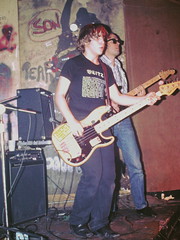Pat Ivers and Emily Armstrong continue sorting through their archives of punk-era concert footage as it’s digitized for the Downtown Collection at N.Y.U.’s Fales Library.
You can’t talk about punk rock without talking about Richard Hell. Television, the band he founded in 1973 with then best friend Tom Verlaine, was one of the groups – along with Blondie and the Ramones – that laid the foundation for the downtown scene at CBGBs. Sex Pistols impresario Malcolm McLaren purportedly looked at a poster of Television in 1974, pointed at Richard and said, “I want to start a band that looks like him.”
With his chopped hair and ripped-up shirt, Hell looked like nobody else. And with his kinetic, jangly stage presence and slinky bass, he sounded like nobody else. “Richard had some charisma you can’t buy in a store and apply to yourself like a cream,” recalled Television guitarist, Richard Lloyd. ”He had ‘it,’ the inimitable ‘it,’ the mysterious ‘it.’ His loopy bass lines were cartoonish in their wonderment; he was fantastic.”
Not everyone in the band agreed and Richard left to join the Heartbreakers with Johnny Thunders in 1975. But sharing stage and song time with Thunders seemed like a Television rerun for Hell: “I wanted to try something quicker, more strange than the stuff Johnny wanted,” he said.
Hell considered his months with the Heartbreakers to be the most fun he ever had performing, but he left in 1976 to form the Voidoids. They were an amazing band. Ivan Julian and the late Robert Quine shared duties on lead and rhythm guitar, Mark Bell (a.k.a. Marky Ramone) played drums and Richard was frontman and bassist.
Hell was working at Cinemabilia, a film-buff bookstore, where he met Quine in 1976. “He was old (32), he was bald and nobody was interested in having him in the band,” said Hell. “He was prone to humiliation, it came naturally to him. I was the first guy around that respected him for what he respected in himself, that he was a musician.”
Critic Lester Bangs predicted that Quine, with his keening lead lines and atonal yet melodic chord progressions, would one day be recognized as a pivotal guitarist of his era. Collaborators like Brian Eno, Lou Reed and Matthew Sweet agreed. This year, Spin magazine voted him one of the 100 Greatest Guitarists of All Time.
Guitarist Ivan Julian joined the Voidoids by answering an ad in the Village Voice. Just back from a European tour with The Foundations, of “Build Me Up Buttercup” fame, he was looking for a new scene. He and Hell clicked and began writing songs together. “We wanted to make loud, sexy, angry music,” said Julian.
Mark Bell had been drumming with Wayne County when Richard coaxed him into joining the band. Hell remembered that it all happened very quickly. “We were so excited to be playing together and the possibilities of what we could do,” he said. “We took all kinds of chances, tried all kinds of new things. For a year or 18 months it was pretty interesting. But when we made the record it got tired.”
Their 16-year-old roadie, Jahn Xavier (aka X-Sessive), knew things were in flux. “Mark quit the band for the Ramones, shocking everyone. And Richard didn’t want to play bass anymore,” he said. Downtown musician and scenemaker Deer France encouraged Jahn to step up and change his role. “It’s the same as playing guitar just with the first four strings.” she told him. When Richard mentioned he was looking for a new bass player, Jahn volunteered. James Morrison joined them on drums, cementing the new lineup.
They carried on, touring in Europe, recording and performing locally. David Bowie came to CBGBs to see the Voidoids in August 1979, the night we shot this performance of “Love Comes in Spurts.” It was an old song of Richard’s dating back to his days with the Neon Boys in 1973. He had played it with every band he had ever been in. Somehow, it always felt fresh.
Ultimately, things would change. “He just didn’t want to be the leader of a rock and roll band anymore,” Jahn recalls. It was that simple and that was the end of it.
These days, Hell devotes his energies to writing fiction, poetry and increasingly, essays on film. He most recently introduced Robert Bresson’s “The Devil, Probably”, at BAMs Cinematheque. Later this year, Hell will be depicted in two films, ”Greetings From Tim Buckley” and “CBGB. “ As Hell wrote in his punk anthem, Blank Generation, “its such a gamble when you get a face.” Stay tuned for that.







